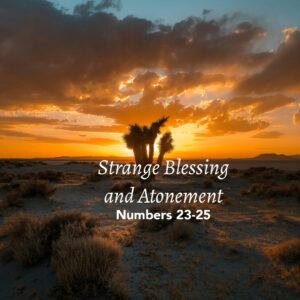Numbers 23-25: Strange Blessing and Atonement
March 10, 2024
TODAY'S BIBLE READING:
Numbers 23-25, Psalm 57, Matthew 24:15-35, Romans 7:1-12

Now we get to hear what Balaam actually says. This strange figure, some sort of necromancer, diviner, but at the same time one insisting that he can only speak what God says. How are we to understand him? Balaam’s donkey is the best clue. If God can speak truly through Balaam’s donkey, he can certainly speak truly through Balaam, and the gifts of God do not necessarily equate with the fruit of the Spirit.
This lesson is so important it is worth underlining: today we still often think that a gifted “communicator” necessitates high character, or that some with the gift of healing or prophecy or some other charismatic gift means that they are inevitably also holy. But the two do not necessarily go together, though sometimes they can with wonderfully marvelous results. Jesus himself taught that there would be people who would prophesy and perform miracles and cast out demons in his name, but who actually never knew him at all and were lost eternally (Matt. 7:22). What matters in terms of salvation is not the ability to speak or write or think or perform miracles; what matters is the fruit of the Spirit of a regenerate heart—love, joy, peace, patience. Christlikeness, in short, is the standard, not impressive abilities.
Balaam’s actual words are a blessing (23:7-10, 18-24; 24:2-9). He speaks blessing three times, and each time frustrates Balak who has hired him to curse Israel. The fourth time Balaam speaks (24:15-19), he speaks Messianically of a “star” that shall come out of Jacob and a “scepter” that shall rise out of Israel (24:17). This leader, king of God’s people, fulfilled first in David, and then in David’s greater Son, the Christ, will protect his people, save them, and give them the Promised Land, even to dispossessing Edom and other tribes whose guilt and evil had forfeited their right to their territory at the time—and will lead us to the True and Better Promised Land of the New Heaven and the New Earth which is the home of righteousness. Despite these wonderful promises—even from the lips of someone who had been hired to curse them, they are blessed, emphasizing the unstoppable blessing coming Israel’s way—despite all this, it is but a moment later that the Israelites are once again capitulating to the surrounding morals of their culture (Num. 25).
Before we rush to judgment on these fickle disciples of God, we should ask ourselves how long it is before we are wandering again after reading the Bible? We need constantly to be in God’s Word, listening to the blessing of God’s Word, and be careful not to copy the tendency of the peoples around us by moral compromise. But Israel “whores” after the “daughters of Moab” (25:1). In ancient times religion was inextricably tied together with politics, marriage, family, and the connection with the one would lead to connections with the other. It seems as if the “Baals” (25:3), whatever precisely they were, intended a fertility god relationship between sexual intercourse and the blessing of crops and harvest from the fertility god. Sex is often the doorway to pseudo-spiritual experiences, and the avenue frequently through which the devil tempts the best leaders, and the godliest of people. Be like Joseph, and flee temptation before it has its foothold in your flesh.
Such abandonment of God—again a theocracy where eternal judgments are meted out in temporal moments, unlike the New Testament church—must have its just rewards, and Moses is following God’s commands to ensure discipline and faithfulness returns to the camp. While the people are weeping and repenting, a particularly flagrant “whoring” takes place in full view of them all, and one young man takes upon himself to end the matter (25:6-8). It is a gruesome picture, a coupling couple put to death in the throws of their embrace by a spear through the two of them, but again and again God is teaching his people that his name is holy, is to be feared, and that to approach him they must have atonement through their sins. There are only two places where our sins can find their just deserts: in hell, where we experience God’s judgment eternally, or at the cross, where God’s eternal judgment was experienced by God himself in the person of his Son in one moment infinitely. Pray to God, and seek him while he may be found that you might hide yourself under the banner of the saving work of Christ your righteousness.
ABOUT THE AUTHOR
Josh Moody (Ph.D., University of Cambridge) is the senior pastor of College Church in Wheaton, IL., president and founder of God Centered Life Ministries, and author of several books including How the Bible Can Change Your Life and John 1-12 For You.
WANT MORE?
To receive God Centered Life devotionals directly in your inbox, as well as other resources, enter your email address in the form at the bottom of this page and click "subscribe."

